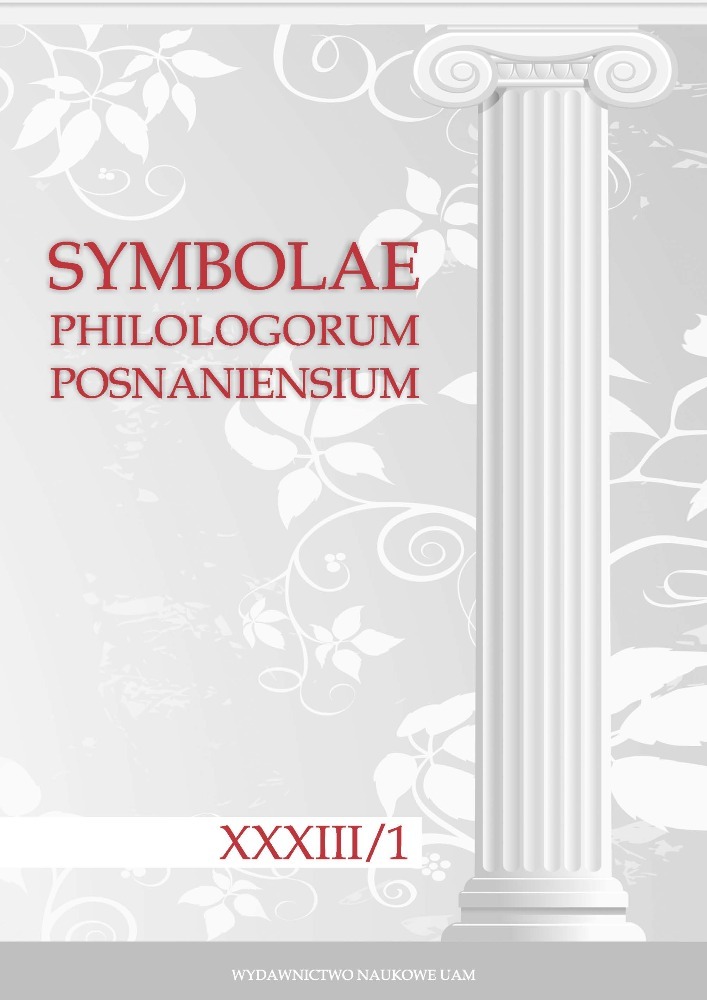Abstrakt
The article deals with the structure of the Latin tragedy Julius Caesar by Caspar Brülovius, a Pomeranian playwright associated with the Academy in Strasbourg. The text was published in 1616, has as many as 2580 verses and shows historical events that took place over the years: from 46 B.C., when Caesar triumphed, to 30 B.C., when the naval battle of Actium ended. One can get the impression that Brülovius carefully planned the original construction of his work: Acts II and III constitute the actual tragedy about Caesar, probably the closest to ancient plays, with a homogeneous, compact action and one main character. This part of the drama could exist on its own (without the other acts). Act I presents Caesar’s achievements (the conquest of Gaul) and is primarily aimed at educating Strasbourg students. The remaining acts (IV, V) not only pursue didactic goals, but also satisfy the tastes of the audience of the time, who probably liked the strings of death and horrors shown directly on the stage and the interweaving of comic elements with real tragedy. As a whole, Brülovius’ work is a non-classical drama, but Acts II and III, considered as a separate whole, constitute a classical drama.
Bibliografia
C. Brülovius, Caius Iulius Caesar tragoedia, ex Plutarcho, Appiano, Alex., Suetonio, D. Cassio, Ioh. Xiphilino etc. maximam partem concinnata et adversus omnem temerariam seditionem atque tyrannidem ita conscripta […], typis A. Bertrami, Argentorati 1616.
C. Brülovius, ‘Caius Iulius Caesar’ Tragoedia (1616), Regensburg 2007.
C. Brülovius, C. Julius Caesar Tragoedia, oprac., przypisy, wykaz imion i nazw geograficznych L. Winniczuk, M. Grzesiowski, akt I: „Meander” 46 (1991), z. 11–12, 442–487; akt II i III: „Meander” 47 (1992), z. 1–2, 63–102; akt IV i V: „Meander” 47 (1992), z. 3–4, 169–206.
Cicéron, Brutus, texte établi et traduit par J. Martha, Paris 1973.
Eschilo, Agamennone, Coefore, Eumenidi, a cura di D. Del Corno, Milano 1999.
Eschilo, Persiani, Sette contro Tebe, a cura di G. Ieranò, Milano 2000.
Eschilo, Supplici, Prometeo incatenato, a cura di L. Medda, introduzione di D. Del Corno, Milano 1999.
Euripides, Tragoediae, ex recensione A. Nauckii, vol. I, Lipsiae 18602; vol. II, Lipsiae 1876.
Horatius, Opera, ed. D.R. Shackleton Bailey, Monachii et Lipsiae 2001.
M. A. Muret, Julius Caesar, w: Cesar de Jacques Grevin, edition critique avec introduction et des notes par J.A. Foster, Houston 1968.
Plutarque, Vies, vol. IX: Alexandre-César, texte établi et traduit par R. Flacelière et É. Chambry, Paris 1975.
Seneca, Tutte le tragedie, introduzione e versione di E. Paratore, Roma 2006.
W. Shakespeare, Juliusz Cezar, przeł. S. Barańczak, Poznań 1993.
Vergilius, Opera, rec. O. Ribbeck, Lipsiae 1903.
Bogumił 2007: I. Bogumił, Adaptacje sceniczne czy dramaty? Antyczny epos jako źródło łacińskich tragedii i tragikomedii przełomu XVI i XVII wieku, Gdańsk 2007.
Bogumił 2009: I. Bogumił, „Chariclia” Kaspra Brüloviusa, czyli jak Heliodorowy romans przekształcić w tragikomedię, w: Aemulatio & Imitatio. Powrót pisarzy antycznych w epoce renesansu, red. K. Rzepkowski, Warszawa 2009, 167–181.
Bradner 1957: L. Bradner, The Latin Drama of the Renaissance (1340–1640), „Studies in the Renaissance” IV (1957), ed. by M.A. Shaaber, 31–70. DOI: https://doi.org/10.2307/2857139
Dietl 2013: C. Dietl, Neo-Latin Humanist and Protestant Drama in Germany, w: Neo-Latin Drama and Theatre in Early Modern Europe, eds. J. Bloemendal, H.B. Norland, Leiden–Boston 2013, 103–183. DOI: https://doi.org/10.1163/9789004257467_004
Flood 2006: J. Flood, Poets Laureate in the Holy Roman Empire: A Bio-bibliographical Handbook, Berlin 2006. DOI: https://doi.org/10.1515/9783110912746
Głombiowska 2004: Z. Głombiowska, Z Apoloniusza „Perykles”, w: Czytanie Szekspira, red. J. Fabiszak, M. Gibińska, E. Nawrocka, Gdańsk 2004, 213–225.
Goedeke 1886: K. Goedeke, Grundrisz zur Geschichte der deutschen Dichtung aus den Quellen, vol. II: Das Reformationszeitalter, Dresden 18862. DOI: https://doi.org/10.1524/9783050052410
Grzesiowski 1991: M. Grzesiowski, M. Caspara Brülowa tragedia o Juliuszu Cezarze, „Meander” 46 (1991), z. 11–12, 419–441.
Hanstein 2013: M. Hanstein, Caspar Brülow (1585–1627) und das Straβburger Akademietheater. Lutherische Konfessionalisierung und zeitgenössische Dramatik im akademischen und reichsstädtischen Umfeld, Heidelberg 2013. DOI: https://doi.org/10.1515/9783110323405
Roloff 1965: H.-G. Roloff, Neulateinisches Drama, w: Reallexikon der deutschen Literaturgeschichte, vol. II, ed. P. Merker, Berlin 1965, 645–678.
Skopnik 1935: G. Skopnik, Das Straβburger Schultheater, Sein Spielplan und seine Bühne, Frankfurt am Main 1935.


